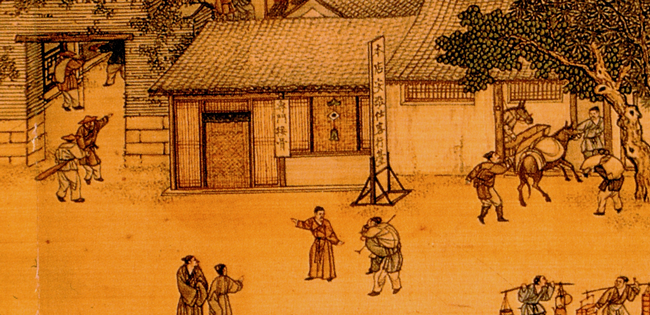This project investigates the ways in which authority of knowledge was constructed in late imperial Chinese medical cases (16th to 19th centuries).
Research

Orthopedic medical practice | Source: Detail from the Quing Dynasty picture scroll “Along the River During the Qingming Festival” | © HGI Charité
Medical narratives and cases in particular constitute the ideal genre for imitating attributes of social authority within a knowledge text, and they allow for an idealized performance of knowledge and the construction of authority relations, which may radiate out of the text back into the social world. As these narratives were recorded and recounted for different purposes by different types of healers, strategies of authorization varied depending on the norms, values, and customs emphasized by these healers’ social and epistemic environment. This shows, firstly, in the ways in which the authors of medical cases described these environments and defined their place within, secondly, in the ways they performed the application of knowledge, and, thirdly, in the language and rhetoric they applied.
Findings
To analyze these strategies, Nalini Kirk looks at printed cases of literati physicians of varying social status, one bonesetter, and one itinerant healer, as well as hand-written manuscripts by unknown physicians and folk healers. Some of the manuscripts were obviously intended for publication and therefore show similar features as printed case records: text structure, technical terminology, rhetorical devices, emphasis on lines of transmission, etc., demonstrated scholarship, expertise, moral conduct, or traditionalism as the values underlying the authority of knowledge. Manuscripts by itinerant physicians, in comparison, transmitted narratives as rhetorical strategies to attract customers in the marketplace, drawing on other qualities that resonated more with their social environment: humor, entertainment, and the availability of medicinals appear just as important as the assumed claim of literati expertise or moral conduct. A comparative view of these texts reveals the techniques medical authors applied to construct traditional, charismatic, or expertly authority, it shows how these techniques varied depending on the author’s respective social position, and, finally, it makes us reflect claims of authority in present-day Chinese medicine.
This thesis is being written within the PhD program “History of Ancient Science” (HistAS) at the Berlin Graduate School of Ancient Studies (BerGSAS).
